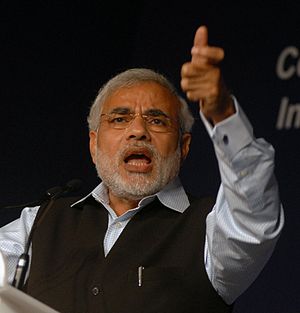 Washington, Mar 3: The prestigious Wharton school today cancelled the keynote address of Gujarat Chief Minister Narendra Modi following uproar from a section of university professors and students on the invitation.
Washington, Mar 3: The prestigious Wharton school today cancelled the keynote address of Gujarat Chief Minister Narendra Modi following uproar from a section of university professors and students on the invitation.
The organising committee of the prestigious annual event apologized for putting the university and the Wharton School administration in a "difficult position".
It said Modi's address would be replaced by a prominent Indian leader, whose name would be released very soon.
But standing by its decision to invite Modi for the event, the organising committee hoped to invite him later some time without causing such a distraction as it has done now.
"Mr Modi's keynote address at Wharton India Economic Forum has been cancelled," the Wharton India Economic Forum said in a statement.
Modi was invited to deliver the keynote address at the Forum to be held in Philadelphia on March 22-23 via videoconference.
"We hope to have Mr Modi speak at a more appropriate forum where he can interact with students without the distraction of this kind of attention," the statement said.
A group of Wharton's professors and students had written a strongly-worded letter saying they are outraged to learn that the Forum has invited Modi as a keynote speaker.
The letter noted, "This is the same politician who was refused a diplomatic visa by the United States State Department on March 18, 2005 on the ground that he, as Chief Minister, did nothing to prevent a series of orchestrated riots that targeted Muslims in Gujarat."
Planning Commission Deputy Chairman Montek Singh Ahluwalia is expected to address the Forum on March 23.
"With all the chosen speakers across multiple keynotes and panels, our goal as a team is to provide a neutral platform to encourage cross pollination of ideas as we all work towards contributing to India's success.
"Through this ideology, we hope to present multiple opinions and ideas to our audiences and supporters across the world and constructively contribute to the intellectual milieu for which University of Pennsylvania and The Wharton School stand," the statement said.
Arguing that they do not endorse any political views and do not support any specific ideology, the Forum said their goal as a team is only to stimulate valuable dialogue on India's growth story, where students and audiences can interact with influential leaders from across India.
The student organising body was extremely impressed with Mr. Modi's credentials, governance ideologies, and leadership, which was the primary reason for his invitation, it said.
"However, as a responsible student body within the University of Pennsylvania, we must consider the impact on multiple stakeholders in our ecosystem," it explained.
"Our team felt that the potential polarizing reactions from sub¬segments of the alumni base, student body, and our supporters, might put Mr Modi in a compromising position, which we would like to avoid at all costs, especially in the spirit of our conference's purpose," the statement said.
Asserting that it stands by its decision to invite Modi, the organising committee said it believes that this course of action would be the most appropriate in light of the reactions of the multiple stakeholders involved.
"Therefore, we as a team, would like to apologize for being a catalyst may have put Mr. Modi and the Wharton School administration in an difficult position," it said.
The Wharton India Economic Forum, an annual student run India-centric conference started in 1996, aims to bring together business and political leaders, professionals, academics and students from across
the world to discuss India's evolution into a global economic power, the key social, political and financial challenges which still stand in its way and possible solutions.
The committee said it is in the last stages of finalizing an additional keynote address to complete its lineup.
"This keynote will be delivered by a very prominent Indian leader and will be announced very soon on our website," it added.
Among other eminent invited guests to the conference include Milind Deora, the Union Minister of State for IT and Communications; Gautam Adani, chairman of the Adani Group; actress Shabana Azmi, poet and scriptwriter Javed Akhtar.
Earlier keynote speakers have included former president Dr A P J Abdul Kalam, Union Finance Minister P Chidambaram, BJP leader Varun Gandhi and industrialist Anil Ambani.





Comments
Add new comment